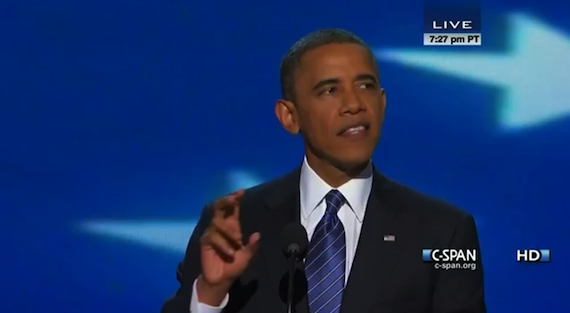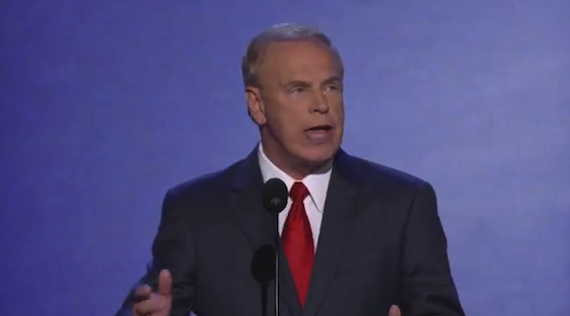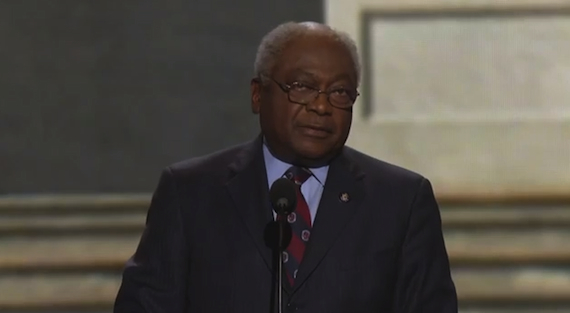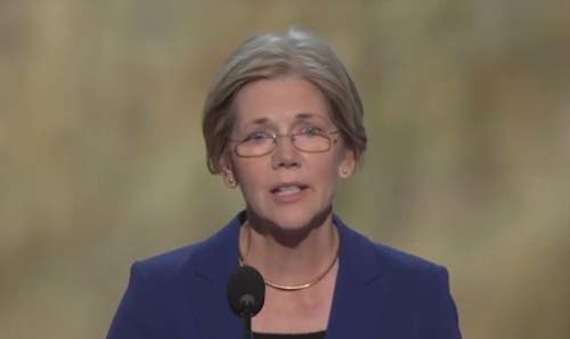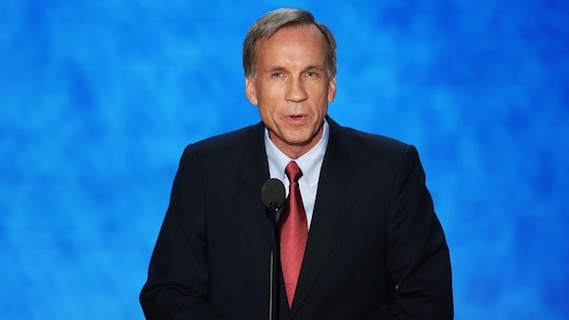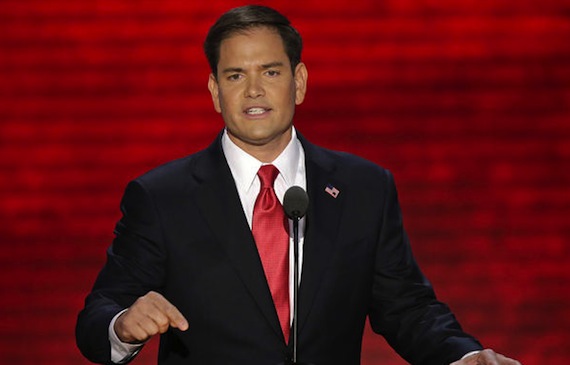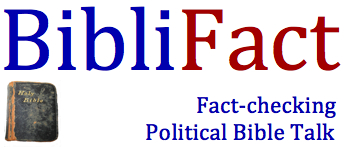
"They welcomed the message very eagerly
and examined the scriptures every day
to see whether these things were so"
--Acts 17:11
As we make our way toward the 2012 elections, many feel tossed to and fro by often contradicting claims about what the Bible says on this or that political issue. Most people just don't know the Bible well enough to say whether these claims are right, wrong, correct, incorrect or a matter of interpretation. How can we keep political Biblespeak honest? Inspired by PolitiFact.com, BibliFact roundups aim to do just that.
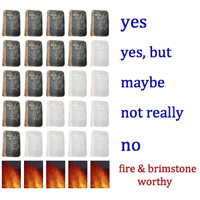
Conventional Snippets of Uplift and Hope
The Bible possesses a kind of iconic power in American culture that has little to do with its contents. Indeed, sometimes its contents and its iconicity clash, as was the case for Paul Ryan during the 2011 Faith and Freedom Conference, when the Catholic group Faithful America offered him a Bible in which passages about caring for the poor and the marginalized were highlighted. They asked him why he preferred Ayn Rand's views to those of Scripture when in came to social welfare policies. Ryan rejected the Bible, climbed into his big black SUV, and rode away.
The Bible's sacred capital is best translated into political capital in tiny bits taken out of context, as though it were a collection of nice sayings, The Golden Book of Moral Uplift. An edifying clause here, a phrase of hope or blessing there is enough to claim biblical endorsement. Such well-placed biblical snippets do the trick, binding a politician's words with the Word. More than that and it can get messy.
In the run-up to elections, we are likely to see more and more examples of this kind of biblical cherry-picking. In this respect, the Republican and Democratic national conventions gave us a pretty good sense of what to expect.
Bible Clips at the Democratic National Convention
"I don't know what party these men and women belong to. I don't know if they'll vote for me. But I know that their spirit defines us. They remind me, in the words of Scripture, that ours is a 'future filled with hope.' And if you share that faith with me -- if you share that hope with me -- I ask you tonight for your vote." -- President Barack Obama, accepting the party's nomination, Democratic National Convention, Sept. 6, 2012
 Yes, that's a phrase from the prophet Jeremiah, but the context is completely different. In Jeremiah, it's part of a larger declaration from God that Babylon will be allowed to dominate the exiled Judean people for 70 full years. Once that's done, however, God says "I will be kind and bring you back to Jerusalem, just as I have promised. I will bless you with a future filled with hope" (Jeremiah 29:10-11). Interesting that President Obama here uses the Contemporary English Version translation rather than the New International Version ("give you hope and a future"), more popular among evangelicals, or the New Revised Standard Version ("a future with hope"), more popular among liberals. In any case, the gist of Jeremiah, taken in context, is that you'll be oppressed and downtrodden for decades, but your distant future is full of hope and restoration.
Yes, that's a phrase from the prophet Jeremiah, but the context is completely different. In Jeremiah, it's part of a larger declaration from God that Babylon will be allowed to dominate the exiled Judean people for 70 full years. Once that's done, however, God says "I will be kind and bring you back to Jerusalem, just as I have promised. I will bless you with a future filled with hope" (Jeremiah 29:10-11). Interesting that President Obama here uses the Contemporary English Version translation rather than the New International Version ("give you hope and a future"), more popular among evangelicals, or the New Revised Standard Version ("a future with hope"), more popular among liberals. In any case, the gist of Jeremiah, taken in context, is that you'll be oppressed and downtrodden for decades, but your distant future is full of hope and restoration.
"Mitt Romney has so little economic patriotism that even his money needs a passport. It summers on the beaches of the Cayman Islands and winters on the slopes of the Swiss Alps. In Matthew, chapter 6, verse 21, the scriptures teach us that where your treasure is, there will your heart be also. My friends, any man who aspires to be our president should keep both his treasure and his heart in the United States of America." -- Former Ohio Gov. Ted Strickland, Democratic National Convention, Sept. 4, 2012
 This passage, which is the punch line of one of Jesus' teachings from the so-called Sermon on the Mount in the Gospel of Matthew, makes for a nice dig on Mitt Romney's practice of storing treasures in other countries. Taken in context, however, it doesn't really apply, at least in the way Former Gov. Strickland wants it to. Jesus isn't talking about "economic patriotism" or banking in one's own country versus another; he's talking about storing worldly treasure at all: "Do not store up for yourselves treasures on earth, where moth and rust consume and where thieves break in and steal, but store up for yourselves treasures in heaven, where neither moth nor rust consumes and where thieves do not break in and steal. For where your treasure is, there your heart will be also" (Matthew 6:19-21; New Revised Standard Version). "Heaven" or the "kingdom of heaven" is the compelling yet riddling center of Jesus' teachings in Matthew. He never comes close to defining it. He speaks about it metaphorically, mostly in parables ("the kingdom of heaven is like ... a mustard seed ... a merchant in search of fine pearls ... a net that is thrown into the sea"). Taken together, these teachings point to a kind of close-at-hand divine economy that offers a radical alternative to the world as we know it, full of surprises and inversions. Invest your heart and treasure in that yet-to-be-fully-realized divine economy, Jesus seems to be saying, rather than in this world. In that light, storing treasures in one's home country would be no better than storing it in another.
This passage, which is the punch line of one of Jesus' teachings from the so-called Sermon on the Mount in the Gospel of Matthew, makes for a nice dig on Mitt Romney's practice of storing treasures in other countries. Taken in context, however, it doesn't really apply, at least in the way Former Gov. Strickland wants it to. Jesus isn't talking about "economic patriotism" or banking in one's own country versus another; he's talking about storing worldly treasure at all: "Do not store up for yourselves treasures on earth, where moth and rust consume and where thieves break in and steal, but store up for yourselves treasures in heaven, where neither moth nor rust consumes and where thieves do not break in and steal. For where your treasure is, there your heart will be also" (Matthew 6:19-21; New Revised Standard Version). "Heaven" or the "kingdom of heaven" is the compelling yet riddling center of Jesus' teachings in Matthew. He never comes close to defining it. He speaks about it metaphorically, mostly in parables ("the kingdom of heaven is like ... a mustard seed ... a merchant in search of fine pearls ... a net that is thrown into the sea"). Taken together, these teachings point to a kind of close-at-hand divine economy that offers a radical alternative to the world as we know it, full of surprises and inversions. Invest your heart and treasure in that yet-to-be-fully-realized divine economy, Jesus seems to be saying, rather than in this world. In that light, storing treasures in one's home country would be no better than storing it in another.
A couple verses later, Jesus offers another teaching about treasures that indicts wealth more pointedly: "No one can serve two masters; for a slave will either hate the one and love the other, or be devoted to the one and despise the other. You cannot serve God and wealth" (Matthew 6:23). Strickland could certainly have wielded these and many, many other teachings of Jesus as unequivocal indictments on personal wealth. But of course that sword cuts both ways, and this campaign, unlike Jesus, has big donors to court.
"We should not run from the term Obamacare. I am glad Obama cares. Because Obama cares, children born with diabetes can no longer be denied coverage. People with catastrophic illnesses can no longer be dropped from coverage when they get sick. Families will no longer have their benefits capped. Romans 13, verse 12: "The night is far spent, the day is at hand. Let us cast off the works of darkness and put on the armor of light." Let us go from this place, lighting candles all across this great country, and re-elect President Barack Obama and Vice President Joe Biden so they can continue moving our country forward into the light." -- Rep. James Clyburn, Democratic National Convention, Sept. 6, 2012
 Yes, Representative Clyburn is quoting directly from the King James Version translation of Romans 13:12. But Paul is not talking about bad days passing and a new day dawning. He's talking about the Second Coming of Christ, which he believed would be very soon. His is an urgent wake up call: "now it is high time to awake out of sleep: for now is our salvation nearer than when we believed. The night is far spent, the day is at hand." In these metaphorical terms, casting off "the works of darkness" means quitting the debauched partying ways of the night (Romans 13:11-14). It's not about staying the course or moving forward into the light but snapping out of night stupor and sobering up for a radically new day.
Yes, Representative Clyburn is quoting directly from the King James Version translation of Romans 13:12. But Paul is not talking about bad days passing and a new day dawning. He's talking about the Second Coming of Christ, which he believed would be very soon. His is an urgent wake up call: "now it is high time to awake out of sleep: for now is our salvation nearer than when we believed. The night is far spent, the day is at hand." In these metaphorical terms, casting off "the works of darkness" means quitting the debauched partying ways of the night (Romans 13:11-14). It's not about staying the course or moving forward into the light but snapping out of night stupor and sobering up for a radically new day.
"I grew up in a Methodist church and taught Sunday school, and one of my favorite passages of Scripture is, "inasmuch as ye have done it unto one of the least of these my brethren, ye have done it unto me." Matthew 25:40. The passage teaches about God in each of us, that we are bound to each other and we are called to act, not to sit, not to wait, but to act - all of us together." -- Elizabeth Warren, Democratic National Convention, Sept. 5, 2012
 Yes, the verse is from Jesus' description of the final judgment of the nations in Matthew 25:31-46. At that time, he says, the people will be separated like sheep from goats. He will welcome the first group (the sheep) into the kingdom prepared for them, saying, "I was hungry and you gave me food, I was thirsty and you gave me something to drink, I was a stranger and you welcomed me, I was naked and you gave me clothing, I was sick and you took care of me, I was in prison and you visited me." But they will be surprised and ask when they ever did those things, to which he will respond, "Truly I tell you, just as you did it to one of the least of these who are members of my family, you did it to me" (Matthew 25:40). The latter group (the goats) will likewise be surprised to find themselves cursed and told, "just as you did not do it to one of the least of these, you did not do it to me" (Matthew 25:46).
Yes, the verse is from Jesus' description of the final judgment of the nations in Matthew 25:31-46. At that time, he says, the people will be separated like sheep from goats. He will welcome the first group (the sheep) into the kingdom prepared for them, saying, "I was hungry and you gave me food, I was thirsty and you gave me something to drink, I was a stranger and you welcomed me, I was naked and you gave me clothing, I was sick and you took care of me, I was in prison and you visited me." But they will be surprised and ask when they ever did those things, to which he will respond, "Truly I tell you, just as you did it to one of the least of these who are members of my family, you did it to me" (Matthew 25:40). The latter group (the goats) will likewise be surprised to find themselves cursed and told, "just as you did not do it to one of the least of these, you did not do it to me" (Matthew 25:46).
This passage is pretty radical. It goes well beyond the more familiar Golden Rule of doing unto others as you'd have them do unto you. That's about seeing yourself -- your desires and fears -- in another person. But here, as Warren says, it's about encountering God in another person, even and especially when you don't know it. Neither the "sheep" nor the "goats" in the story realized that helping or not helping the hungry, foreign, thirsty, naked, sick and imprisoned was helping or not helping God. Neither group expected God to be identified with such lowly states of need and vulnerability. Note, moreover, that this is about judging the nations, not individuals, and that the sheep and the goats speak collectively, not individually. So Warren is right to emphasize collective action in response to such a teaching.
Still, Warren is stretching the passage at least a little to say that it teaches about "God in each of us." As with so many Gospel texts, God is identified here not with everyone -- not even with the nations under judgment -- but exclusively with the weakest, most disenfranchised, and most vulnerable of human beings within those nations.
Bible Clips at the Republican National Convention
Not without reason, the "least of these" verse from Matthew 25 enjoys heavy rotation among Democrats. Gabriel Salguero and Jim Wallis have drawn from it in support of immigrant rights, for example, and in his Prayer Breakfast speech on Feb. 2, President Obama said he drew inspiration from it in his efforts to fight human trafficking, support foreign aid and stand up "for the poor; for those at the margins of our society."
So it was interesting to hear Mitt Romney's friend and colleague Grant Bennett quote the same passage (King James Version translation) to describe their service together as Mormon lay ministers. "These wonderful, even glorious hours together were spent in serving our fellow men and women. They were spent in service in our church. We embraced Christ's admonition, 'inasmuch as ye have done it unto one of the least of these my brethren, ye have done it unto me.'" Nothing to fact-check here, inasmuch as he's simply saying this passage inspired them to serve others in their church (though, as we've seen already, this passage is about much more than attending to one's own church members).
Mr. Bennett also draws on another passage to explain his and Governor Romney's practical, on-the-ground approach to theology and religion:
"In our early morning calls, Mitt didn't discuss questions of theology. He found the definition of religion given by James in the New Testament to be a practical guide: 'Pure religion is to visit the fatherless and the widows in their affliction.'" -- Grant Bennett, Republican National Convention, Aug. 30, 2012
 Yes, this is a quotation from the epistle of James, a very practical text that emphasizes living out one's faith in action. In contrast to Paul's emphasis on justification by faith, not works, James argues that faith without works is dead (James 2:17). And those works, for James, center on caring for society's most vulnerable. Indeed, his phrase "the fatherless [orphan] and the widow" is a familiar shortlist for such people throughout the Bible (along with the "alien in your midst"). A few verses later, moreover, we read this more pointed indictment: "For if there come unto your assembly a man with a gold ring, in goodly apparel, and there come in also a poor man in vile raiment; And ye have respect to him that weareth the gay clothing, and say unto him, Sit thou here in a good place; and say to the poor, Stand thou there, or sit here under my footstool: Are ye not then partial in yourselves, and are become judges of evil thoughts?" (James 2:2-4; King James Version). Here again, when placed in its larger context, what might otherwise pass in a convention speech as an edifying bit of pious uplift shows itself to be something more radical than either party really wants to hear or say.
Yes, this is a quotation from the epistle of James, a very practical text that emphasizes living out one's faith in action. In contrast to Paul's emphasis on justification by faith, not works, James argues that faith without works is dead (James 2:17). And those works, for James, center on caring for society's most vulnerable. Indeed, his phrase "the fatherless [orphan] and the widow" is a familiar shortlist for such people throughout the Bible (along with the "alien in your midst"). A few verses later, moreover, we read this more pointed indictment: "For if there come unto your assembly a man with a gold ring, in goodly apparel, and there come in also a poor man in vile raiment; And ye have respect to him that weareth the gay clothing, and say unto him, Sit thou here in a good place; and say to the poor, Stand thou there, or sit here under my footstool: Are ye not then partial in yourselves, and are become judges of evil thoughts?" (James 2:2-4; King James Version). Here again, when placed in its larger context, what might otherwise pass in a convention speech as an edifying bit of pious uplift shows itself to be something more radical than either party really wants to hear or say.
"And we are special -- we are special because we are united not as a common race or a common ethnicity. We are bound together by common values, that family's the most important institution in society, and that almighty God is the source of all we have. We are special -- we are special because we have never made the mistake of believing that we are so smart that we can rely solely on our leaders or on our government. Our national motto, "In God We Trust," reminding us that faith in our creator is the most important American value of them all. And we are special -- we are special because we have always understood the scriptural admonition that "for everyone to whom much is given, from him, much will be required." Well, my fellow Americans, we are a uniquely blessed people. And we have honored those blessings with the enduring example of an exceptional America." -- Sen. Marco Rubio, Republican National Convention, Aug. 30, 2012
 Interestingly enough, President Obama also quoted this passage during his Prayer Breakfast last February. And he, like Sen. Rubio, earned a "Yes, but..."
Interestingly enough, President Obama also quoted this passage during his Prayer Breakfast last February. And he, like Sen. Rubio, earned a "Yes, but..."
Yes, Jesus says this to his disciples in the Gospel of Luke after presenting a parable-like scenario (Luke 12:42-48) in which a householder promotes one of his servants to be manager of the other servants. While the householder is away, that servant-manager shirks his responsibilities, beating the other servants and getting drunk. When the householder returns, he is furious and cuts the irresponsible servant-manager to pieces. Jesus concludes that the one who knows what the householder wants -- in this case the servant-manager "to whom much is given" -- and doesn't carry through deserves a far more severe punishment than the one who doesn't know better.
In Jesus' story, then, the much that's given and required is knowledge and responsibility -- knowing what the master wants and being responsible to manage others to that end. In President Obama's Prayer Breakfast speech, however, the much given is the loads of money that wealthy people have been given, and the much required is to give more of it to those less fortunate by giving up tax breaks. And in Sen. Rubio's speech, the much given is the "uniquely blessed" and "special" status that "we" Americans supposedly have, and the much required is to keep "honoring those blessings" by continuing to show how exceptional we are as a nation. Both are far cries from what Jesus was talking about. Indeed, one wonders if either of them or their writers have read the whole biblical story, which is more than a little grim.
